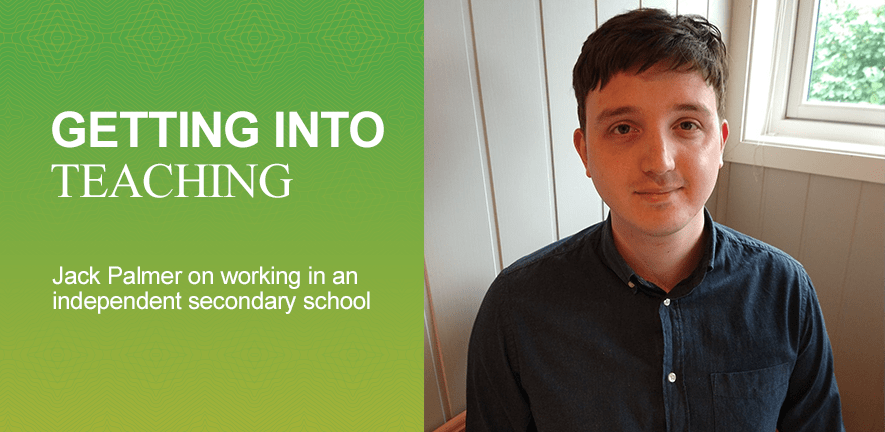Jack Palmer is an English teacher at an independent secondary school, having specialised in British novels of the Second World War here at Cambridge for his MPhil. Here, he shares his best advice for getting into, and thriving at, teaching
I’m 27 and live in West London, where I work as an English teacher at an independent secondary school.
Originally from Norfolk, I read English Literature at the University of East Anglia, after which I studied for an MPhil in Modern and Contemporary Literature at Homerton College, Cambridge, writing a dissertation on British novels of the Second World War.
After graduating in 2015, I worked as an English teacher at Stowe School, a large co-educational boarding school in rural Buckinghamshire.
I taught Years 9–13, coached a senior football team, and acted as an Under Housemaster in a boys’ boarding house, which entailed boarding duties two evenings a week. In return, I was able to live in a flat on the school site, rent-free. Working and living in a boarding school is not dissimilar to working on an oil-rig: I was able to throw myself into the full life of the school, seven days a week. However, after two years there (in which I completed my PGCE and NQT year), I was ready to make the transition to a day school. I was attracted by a vacancy at Latymer Upper School in Hammersmith – the school was uncompromisingly academic, liberal and progressive. Fortunately, I got the job, and have loved the three years I have spent here. I have recently been promoted to Second in Department, a role which I look forward to starting in September 2020.
I made use of the Careers Service during the Michaelmas term.
I found the meeting with the careers adviser to be bespoke, warm and humane, and it was satisfying to be paired with an adviser who clearly had a strong understanding of the Education sector. He gave me invaluable advice about the different kinds of independent school, what employers tend to look for in a candidate, what questions I might face at interview, and when in the year job vacancies tend to be posted.
Before I interviewed to work at a private school, I had, in fact, never stepped inside one.
I was educated in the state system, and, before coming to Cambridge, had never met anyone who had studied at an independent school. I saw these places as one sees a foreign country; they do things differently there. Though I was keen to pursue a career in teaching, the challenges facing educators in the maintained sector were well-documented in 2014. It was conversations with friends at Homerton that made me consider independent schools, and the more I learned about them – freedom from the national curriculum, smaller class sizes, greater room for academic challenge, opportunities to innovate in the classroom – the more I became convinced that this was the environment for me.
Since the first year of my undergraduate degree, I had an inkling that I might enter teaching.
Fortunately, I was able to put myself to the test of small group instruction in the third year of my BA. At the end of two weeks of work experience at a state school in Norwich, I was approached by the Head of English about delivering an AS Level course in Creative Writing. Twice a week, I was to teach a group of eleven Year 12 students; this was a new course, offered as part of the school’s Sixth Form after-school enrichment initiative. The class were tip-top. I was given the freedom to teach what I wanted, and the students were committed to the art and craft of writing. While I flirted with the possibility of embarking on a PhD after my MPhil year, and was even awarded a funded place, the call of the classroom was too strong.
The best advice I can give is to get some experience in schools during the course of your degree
Frequently asked questions, answered!
What skills do you think are the most important to be a good teacher?
A passion for your subject, patience, high expectations, a willingness to try out new techniques, the ability to see young people as distinct individuals, and a skill for telling a compelling story. And a sense of humour, of course.
Do you need a PGCE?
Not necessarily, no! Most graduates wishing to enter the teaching profession will pursue training routes such as a university PGCE course, SCITT, or perhaps the Teach First programme, as each provides the qualification required to work in UK state schools. However, when it comes to independent school teaching, the training pathways can take all manner of forms. Indeed, it was this aspect of the application that was least clear to me when I was reading through job descriptions for full-time posts. The salient differences are twofold: firstly, in a teaching role at an independent school, the position is non-supernumerary (which is to say that the teacher has full responsibility for all of their classes, unlike the traditional PGCE); furthermore, independent schools exercise their independence on all matters, so why shouldn’t they do so when it comes to training their teachers? In recent years, the ‘grow your own’ model has been a favoured approach. This entails a school recruiting a recent graduate, and supporting them through the first year or two of their teaching, before enrolling them in a remote PGCE programme. The teacher then works towards qualified status alongside a reduced teaching timetable. At the moment, the University of Buckingham PGCE is a popular option within the sector, and many schools cover the cost of the trainee’s course fee either partly or in full. On the other hand, some schools won’t ask you to undertake a formal teaching qualification of any sort, as they offer in-house training on a more ad hoc basis instead.
What are some of the challenges you face on a regular basis in your role? And which parts of your job do you most enjoy?
In a large, inner city day school, the pace is fast-moving. On a particularly busy day, for instance, I might teach six lessons, attend an English Department meeting at break-time, run an extra-curricular club during lunch, and meet a parent after school. Things that need urgent attention can also come out of the blue: for example, when asking a student after a lesson why they haven’t submitted their homework, they might disclose a pastoral matter which then needs to be passed on to their Head of Year. Though days like these can be challenging, they do give one a sense of accomplishment.
A source of continual enjoyment is sharing works of literature I love with thoughtful, engaged students. Unpicking virtuoso moments of writing, with a sense of shared endeavour among the class, is a true joy. Analysing the pronoun shifts in Othello’s final soliloquy, weaving through the soundscape of a Gerard Manley Hopkins sonnet, exploring both the high lyricism and the irony of the final sentence of Wuthering Heights . . . these are but a few examples.
What are your top tips for those considering applying?
Even if you are not yet in the final year of your degree, I would recommend reading through vacancies for teaching posts at independent schools. This will give you a sense of what different schools are looking for, and also the sheer variety within the sector – the academic, sporting and pastoral demands in a rural all girls’ boarding school, for instance, will be rather different to that of a co-educational day school in a city. Handshake will list some of these vacancies, though do also check out https://www.hmcteachingjobs.org.uk/. Jobs with a September start tend to be advertised between January and March.
The best advice I can give is to get some experience in schools during the course of your degree. This can be a state school, an independent school, a sixth form college – any time spent in school is of value. Contact schools in the Cambridge area, or in the area that is local to your home (Easter-time or June / July are often good windows in which to spend a week or two shadowing). Most of your time will be spent observing lessons, but when making initial contact with the school you should also emphasise what you can bring to the table: helping out with a club or activity, or offering one-to-one support for students. Some graduates also choose to spend a year working as a Teaching Assistant in a day school, or as a Graduate Teaching Assistant (GTA) in a boarding school, as this helps to bolster their application for a teaching position the following year.
For more on careers in teaching, see our Career Sectors A-Z pages


